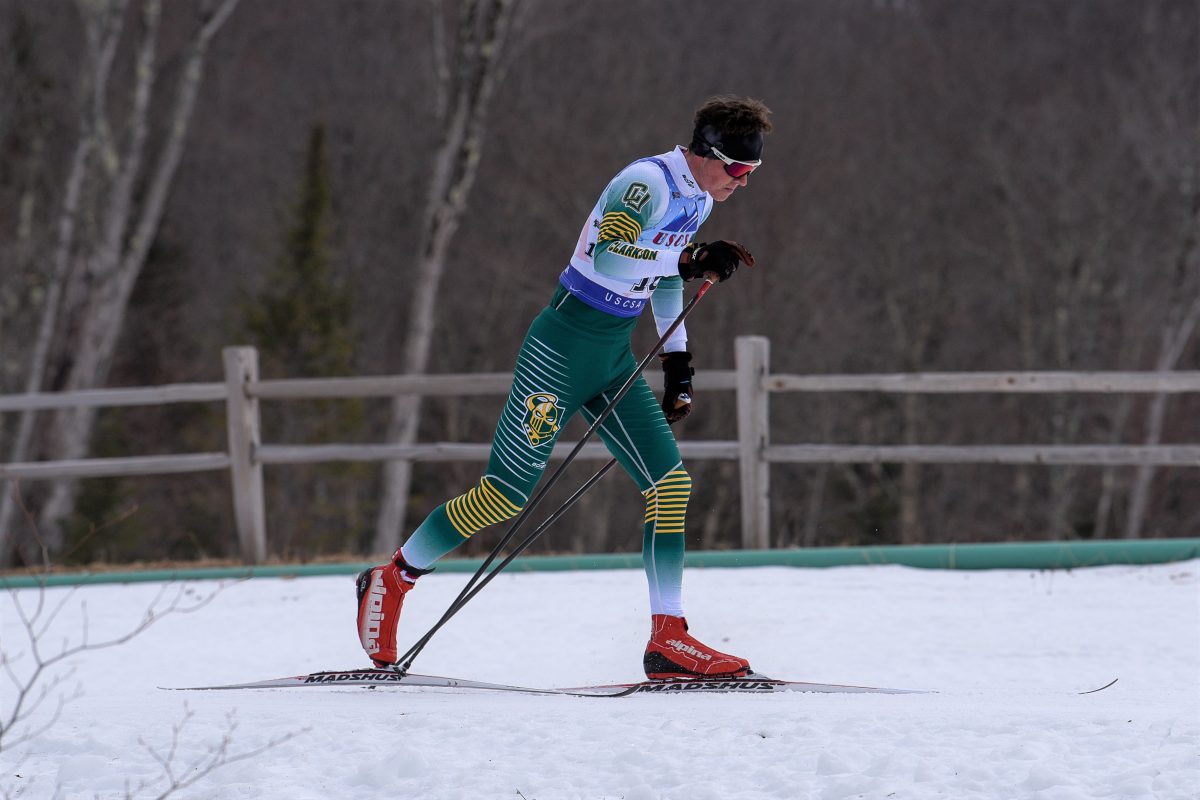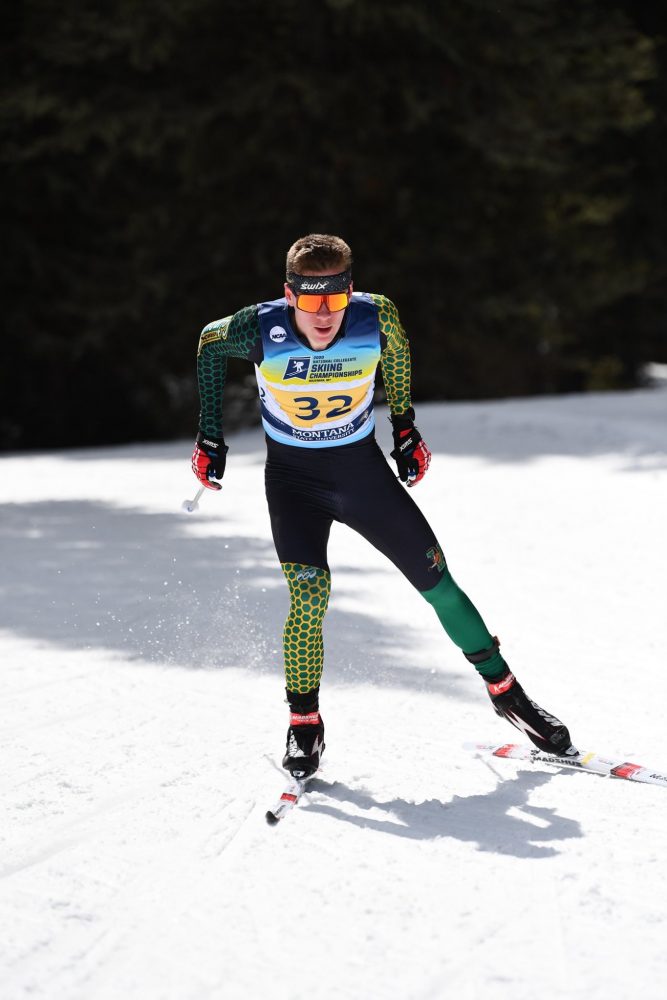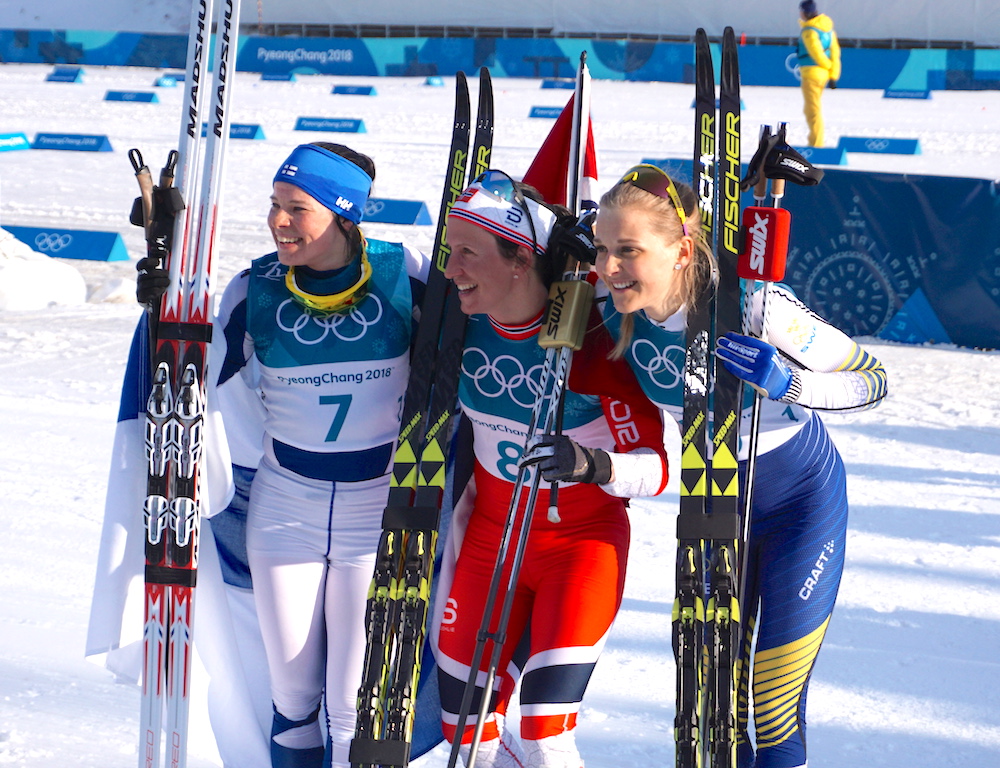
FasterSkier would like to thank Fischer Sport USA, Madshus USA, Concept2, Boulder Nordic Sport, and Swix Sport US for their generous support, which made this coverage possible.
PYEONGCHANG, South Korea — In the final stretch, the familiar Marit Bjørgen ceremony went down with no other skiers in sight and the Norwegian flag in her hand. The 37-year-old five time Olympian and mom is leaving these Games as the winningest Winter Olympian in history.
Prior to Bjørgen, Norwegian biathlete Ole Einar Bjørndalen was the most decorated Winter Olympian with 13 medals total. After earning a bronze in the Pyeongchang team sprint, Bjørgen surpassed Bjørndalen’s medal total by one. She added gold to her collection on Sunday after taking the win in the women’s 30-kilometer classic mass start. All told, Bjørgen now has 15 Olympic medals, eight of them gold.
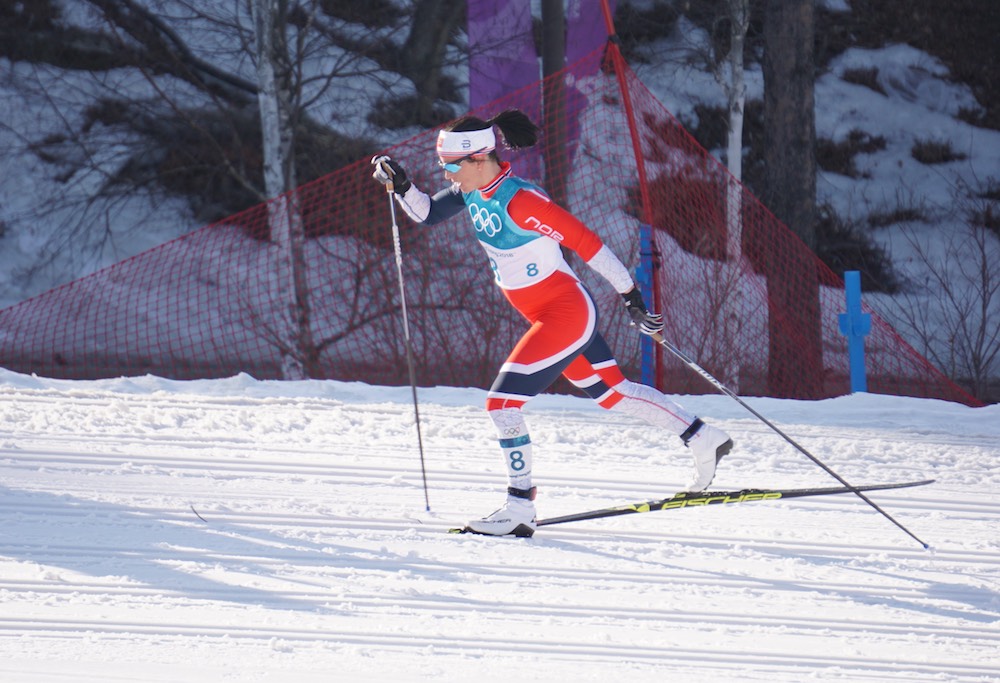
She claimed the win in the final race of the Olympics in 1:22:17.6 hours. Finland’s Krista Pärmäkoski claimed silver (+1:49.5) and Sweden’s Stina Nilsson earned bronze (+1:58.9).
Finishing just 1.5 seconds behind Nilsson and out of the medals ceremony was Norway’s Ingvild Flugstad Østberg in fourth (+2:00.4), Swednen’s Charlotte Kalla placed fifth (+2:57.2), ahead of Finland’s Kerttu Niskanen in sixth (+3:01.6).
American Jessie Diggins closed out her 2018 Winter Games in seventh (+3:37.2), while Norway’s Heidi Weng finished in eighth (+4:07.9). Austria’s Teresa Stadlober ended up ninth (+4:14.1), after skiing in second until a game-ending turn onto the wrong course, and Japan’s Masako Ishida claimed 10th (+4:20.8).
The 30 k classic is Bjørgen’s race. She’s masterfully dominant in the technique and peerless in the distance. In the post-race press conference, Bjørgen words about the women’s ultimate distance race were succinct.
“I think it’s easier to do a good 30 k when you are getting older,” Bjørgen said of her years of training load and its impact on distance preference. “You have lots of training behind you. I have ten years more training than Krista [Pärmäkoski], so then I think it’s a little bit different to do a 10 k than 30 k. I knew that this was my distance also. Today we can see.”
Here’s what we saw: A powerfully rhythmic Bjørgen pull away from an already diminished field. Her force of nature skiing began around 8 k, and by 11.25 k, barring any mishap, her 15th gold was secured.
“I wanted to try to be high speed from the beginning,” Bjørgen said. “I had perfect skis so I can do my technique very good, so I could relax on skis. After seven and a half kilometers, I looked behind me and see it was two, three girls behind me and I tried to push more. Also, after the longest downhill, I had five seconds. Then after one lap I had ten. I knew I had to speed up more, and I heard I had twenty and then thirty. Then I knew that this is my day. I have to ski well and then have all the speed ups. I had the good feeling in my body.”
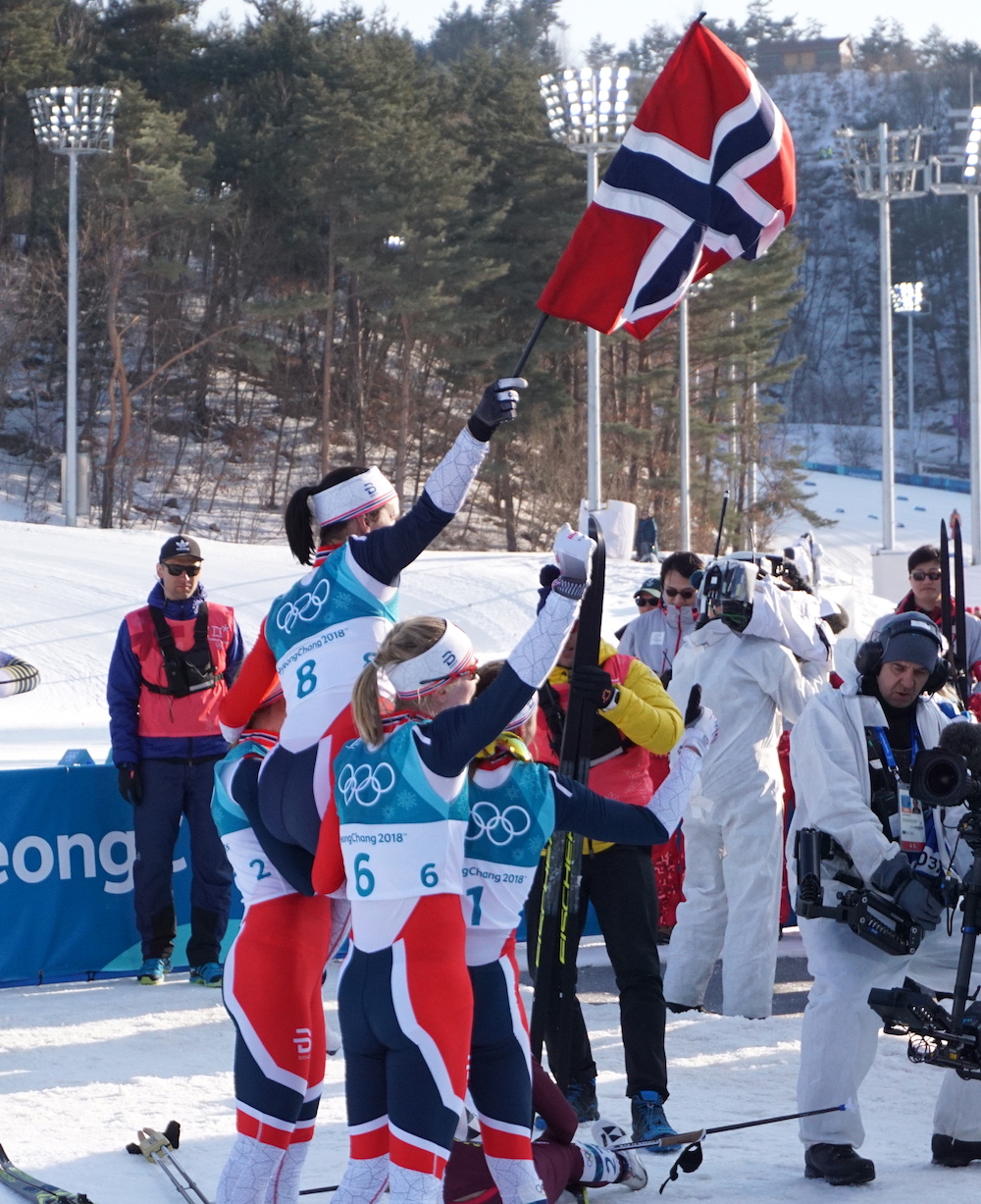
Bjørgen made her Olympic debut at the Salt Lake Games in 2002. There, she won a single silver medal in the 4 x 5 k relay (with Bente Skari, Hilde Pedersen, and Anita Moen. She was 22 at the time). Bjørgen then went on to compete in the 2006 Torino Games, coming away once again with another silver — this time in the 10 k classic. Over the next three Olympics, Bjørgen amassed 13 more medals, eight of them in individual events.
Recognizing the relatively young talent around her on the podium (Pärmäkoski is 27 years old and Nilsson is 24), Bjørgen understood that as she steps down, others are primed to take her place.
“I had my best years from 30 to 37, and she is still not there so I think we will see lots of Krista in the future,” Bjørgen said.
While Bjørgen’s Olympic career is through, she left the door open for competing in the 2019 World Championships this time next year in Seefeld, Austria. Before departing PyeongChang, Bjørgen was in the Olympic limelight one last time as the Norwegian flag bearer in Sunday’s Closing Ceremony.
For more details on how Sunday’s 30 k transpired for silver and bronze, complete with quotes, check out our race rundown.
North Americans Led by Diggins in 7th
American Diggins has already proved a point in PyeongChang: the big stage is hers. She placed fifth in the 15 k skiathlon, fifth in the 10 k skate, sixth in the classic sprint, fifth in the 4 x 5 relay, and first in the team sprint. Bar none, she produced the most-consistent and high-placing run of results any U.S. cross-country skier to date.

Coming into the stadium for the first time during Sunday’s 30 k classic, Diggins again was in the medal hunt. The American took a rare fall on the course’s hallmark technical downhill, setting her for a lung-burning chase back to the lead pack.
“Not everything went according to plan. I rolled my boot in the slush in a nice little crash and had to sprint for a while to get back to the pack,” Diggins told FasterSkier after.
She managed to regain her place at the front within the following lap at 7.5 k. Between 8.3 k and 11 k, a gap slowly opened up in front of Diggins that included Kalla, Niskanen, Pärmäkoski, and Stadlober.
“I spent the rest of the time in no man’s land chugging away,” she reflected. “I felt like I was just sprinting the entire time. I was proud of that. I didn’t give up. I didn’t say, ‘OK, I don’t have a chance to medal, I’ll just screw around out here.’ I really gave it everything I had, and I kept pushing myself.”
The second American on Sunday was Sadie Bjornsen ten places after Diggins in 17th (+6:32.6). Bjornsen said her race was a mixed bag of what she called “good and bad.”

“I tried to stay with the group at the beginning and went on too slick of skis which just exploded myself,” Bjornsen reflected. “Took me a solid 7.5 k to get myself back to together. It was certainly very fun there the last 15 k. Nothing really felt good about it … But I definitely am really happy with the way that I finished that race and digging deep until the end. It was a fun 30 kilometers of suffer fest.”
Like her race, Bjornsen’s second Olympics was a bit of a rollercoaster with a top individual result of 14th in the classic sprint (she also placed 15th in the 10 k freestyle).
“A collection of feelings throughout the Games,” she said. “It was certainly really a bit of a heartbreak to not make the team sprint. Took a little bit of an emotional toll there for a few days. Then to have the medal, that definitely brought it back to nothing but positive vibes.
“It’s a great feeling to walk away with,” Bjornsen continued. “Who knows if I’m coming to the next [Olympics], but if I am coming to the next one, I definitely have some higher goals and some higher hopes. I certainly learned something here.”
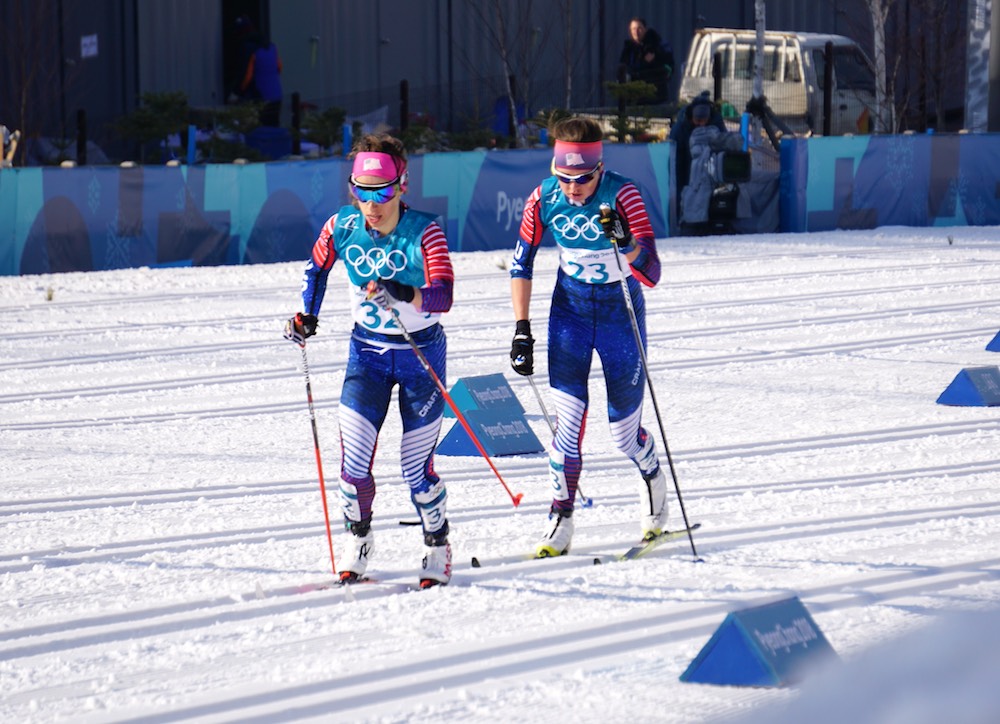
Following Bjornsen’s finish, American Rosie Frankowski finished 21st (+8:53.8). The Minneapolis, Minnesota, native found out three days ago that she would be starting Sunday. Beaming with an ear-to-ear grin after Sunday’s mass start, the 26-year-old Frankowski exuded energy and effervescence after her first Olympic race.
“I was crazy. I didn’t expect, honestly, to feel that good and just keep jamming and going,” Frankowski reflected of her top-30 performance. “I told [my coach Erik] Flora that I was going to start easy, and he just nodded, because I say that every race and I never start easy.”
Frankowski skis for Anchorage’s Alaska Pacific University (APU) under the guidance of head coach Erik Flora. Flora was in PyeongChang as a U.S. coach and provided Frankowski with sage advice as she headed into her first world-caliber race (Frankowski has never competed at the World Cup or World Championships level).
“Honestly, Flora was like, ‘Win or lose, you’re racing in the Olympics,’ ” Frankowski reflected. “My one goal for the whole day was just to finish smiling. I honestly can’t tell you, when I came down that downhill on the last lap, it was so cool. That feeling, and when you’re hyped to have done a 30 k, and to know like you just raced in the Olympics and no matter what your result is, that’s just incredible. I can’t describe that feeling.”
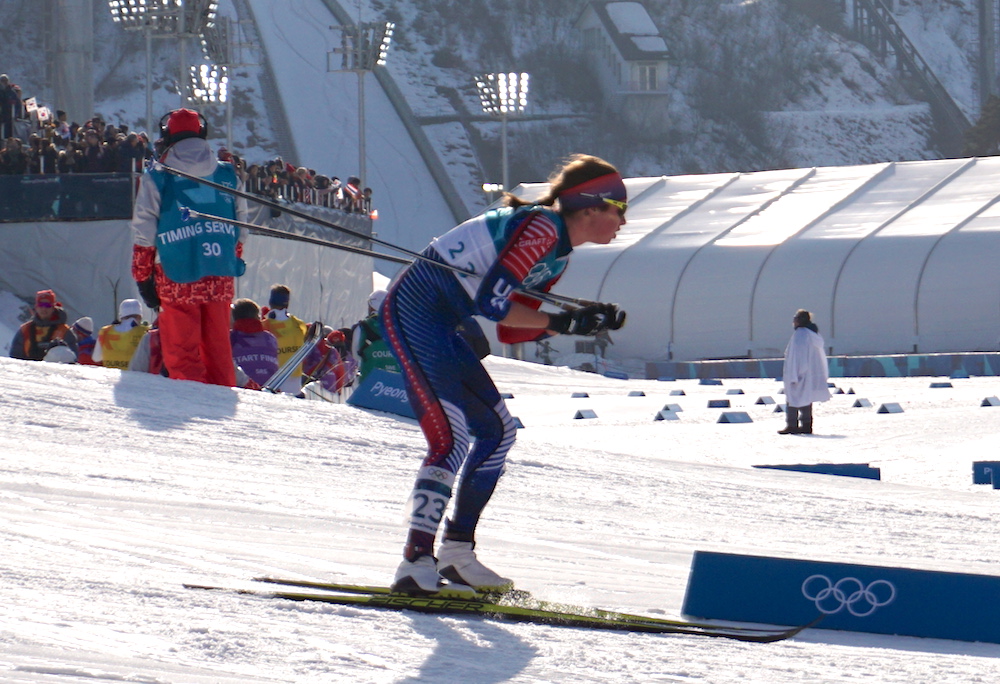
American Caitlin Patterson placed 26th (+10:26).
“It was solid. 30k is such a long race,” Patterson said. “There are ups and there are downs. I guess I’m still processing it a little bit. I’m pleased with the effort that I put out there, I felt like I was working really hard, especially in the middle and second half. I was a little frustrated that all that hard work wasn’t really catching anybody. But overall it was good. It’s still really cool to race here.”
For Canada, Emily Nishikawa led the way in 30th (+12:14.1). She was followed by Cendrine Brown in 43rd (+19:06.3), as Anne-Marie Comeau did not finish.
“It was really tough out there today. I had first good two laps, and then I started feeling low on energy and it was getting harder to kick my skis,” Browne said. “But it was really important for me to keep going no matter what. I’m at the Olympics right now so it wasn’t even a question for me if I wanted to stop or not. I just wanted to keep going.”
The 30th place finish is Nishikawa’s best individual Olympic performance.
— Alex Kochon, Harald Zimmer and Gerry Furseth contributed
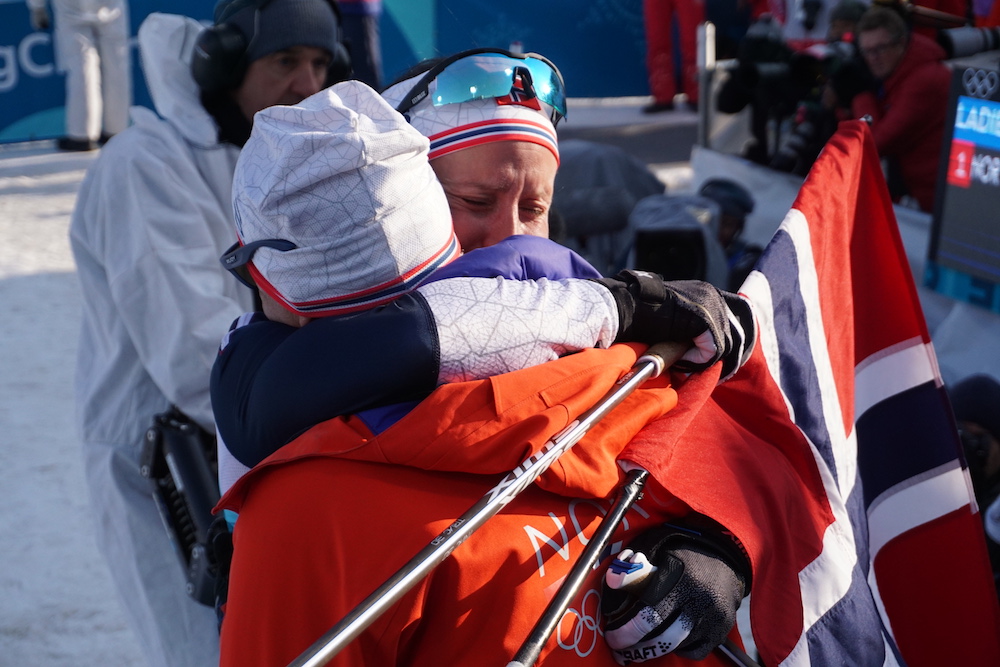
- 2018 Olympic 30 k classic mass start
- 2018 Pyeongchang Winter Olympic Games
- 30-kilometer classic mass start
- Aino Kaisa Saarinen
- Caitlin Patterson
- cendrine browne
- Charlotte Kalla
- Emily Nishikawa
- Heidi Weng
- Ingvild Flugstad Østberg
- Jessie Diggins
- Kerttu Niskanen
- Krista Parmakoski
- Marit Bjørgen
- Nathalie Von Siebenthal
- Pyeongchang
- Ragnhild Haga
- Rosie Frankowski
- Sadie Bjornsen
- Stina Nilsson
- Teresa Stadlober
Gabby Naranja
Gabby Naranja considers herself a true Mainer, having grown up in the northern most part of the state playing hockey and roofing houses with her five brothers. She graduated from Bates College where she ran cross-country, track, and nordic skied. She spent this past winter in Europe and is currently in Montana enjoying all that the U.S. northwest has to offer.


